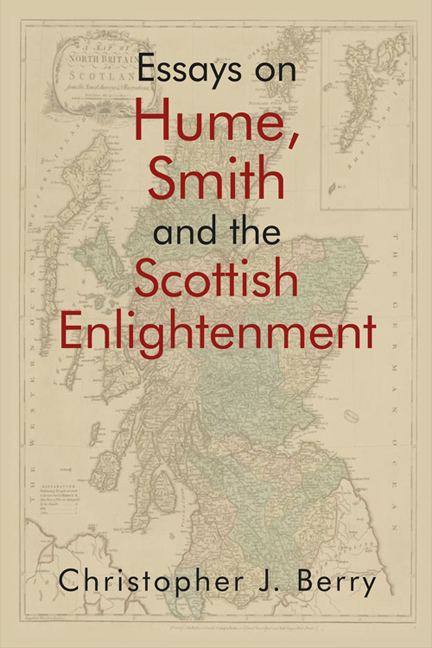20 - Adam Smith’s ‘Science of Human Nature’
Published online by Cambridge University Press: 06 May 2021
Summary
According to Stuart Hampshire, ‘it is possible to characterise philosophy itself as a search for a “definition of man” and to interpret the great philosophers of the past as each producing a different account of the powers essential to man’ (1965: 232). This is merely one analyst's expression of a commonplace. But, of course, this claim is not the preserve of analysts: the philosophers themselves were often aware of the role played by their ‘conception of human nature’. It follows from Hampshire's characterisation that this selfawareness is not the exclusive prerogative of any particular period but it did enjoy a programmatic salience during the Enlightenment.
The following generalisations about that self-awareness seem defensible. There was a convergence on the idea that human nature is constant and uniform in its operating principles. Still in generalising mode, these referred to its determining motives (passions), source of knowledge (sense experience) and mode of operation (association of ideas). By virtue of this constancy, human nature was predictable, so that, once it was scientifically understood, social reform could be undertaken. Hume, for example, in his introduction to the Treatise of Human Nature, regarded his proposed ‘science of man’ as pioneering and fundamental because upon it depended not only logic, morals, criticism and politics but also even mathematics, natural philosophy and natural religion (T Intro, 5/4). He believed, employing Baconian imagery (cf. Bacon 1853: 150), that if science is conquered then a relatively easy victory over the others can be expected. While, as ever, Smith is more circumspect than his friend, he shares Hume's ambitions for the science of man, which Smith calls the ‘science of human nature’ and which he believes was, even in the seventeenth century, in its ‘infancy’ (TMS VI, iii.2.5/319). This chapter aims to explicate what Smith implies about this ‘science’.
Smith's reference to the ‘infancy’ of the science of human nature occurs in Book 7 of The Theory of Moral Sentiments, in a chapter devoted to a critique of systems that invoke reason as the principle of approbation. The treatment, which remained unchanged through all six editions, is, however, cursory and the only rationalist discussed (and that briefly) is Cudworth.
- Type
- Chapter
- Information
- Essays on Hume, Smith and the Scottish Enlightenment , pp. 364 - 384Publisher: Edinburgh University PressPrint publication year: 2018



